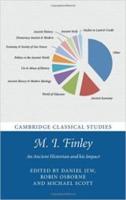
CUP (2016) h/b 348pp £64.99 (ISBN 9781107149267)
Born M. I. Finkelstein in New York in 1912, Moses Finley came to Britain in the early 1950s, having been sacked by Rutgers University after refusing to testify when charged with being a member of the Communist Party. Invited to lecture at Oxford and Cambridge, he was offered posts at both universities but Cambridge got in first. Finley soon established himself as an influential ancient historian, rising to hold the Cambridge chair in 1970. He also became an important player in Cambridge academic politics (he became master of Darwin College in 1976) and rose to the highest levels of British intellectual life (trustee of the British Museum 1977, knighted 1979). Finley’s impact on Britain was not confined to academe, where his powerful and pungent interventions were influential and often controversial; he wrote prolifically for wider audiences, and his distinctive voice was often heard on BBC broadcasts. He also took a hand in the reform of school Classics, chairing the JACT Ancient History Committee and encouraging those who, in the aftermath of the ending of compulsory Latin at Oxbridge in 1960, sought to re-establish Classics as a cultural and not just linguistic subject.
The fifteen essays collected in this book cover much of this ground. They include studies of his major books; his writing on specific topics, including democracy and slavery; his journalism, both printed and broadcast; his undergraduate and graduate teaching; and his relations with other scholars, especially Arnaldo Momigliano. My own first encounter with Finley came when as a sixth-former I read his World of Odysseus (later on he taught me at Cambridge, and we kept in touch when I was a member of the JACT Ancient History Committee). That book, scholarly and imaginative but accessible to the general reader, remains one of the very few of its kind to inspire successive generations; it is vividly discussed here by Robin Osborne, who on returning to it found it not what he had remembered.
Mary Beard digs into the background of Finley’s journalism, finding revealing evidence in the BBC archives. Dorothy Thompson reconstructs his teaching using the memories of his pupils. Recalling Finley’s relationship with Cambridge University, Geoffrey Lloyd emphasises his impact on students outside Classics, and especially in the History Faculty. The chapters devoted to Finley’s work on ancient democracy, slavery and the economy at times go deeper into the details of academic debate than some readers will want, but all are clearly written; they testify to the power of his analyses, but are not afraid to point to contradictions and other weaknesses. Finley’s early years are discussed by Daniel Tompkins, whose definitive biography is forthcoming.
The book does not pretend to be comprehensive, but covers a very wide range of the activities of a remarkable man and outstanding scholar.
Christopher Stray
